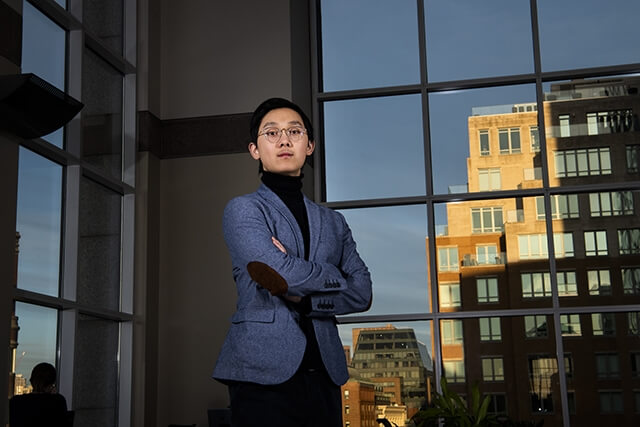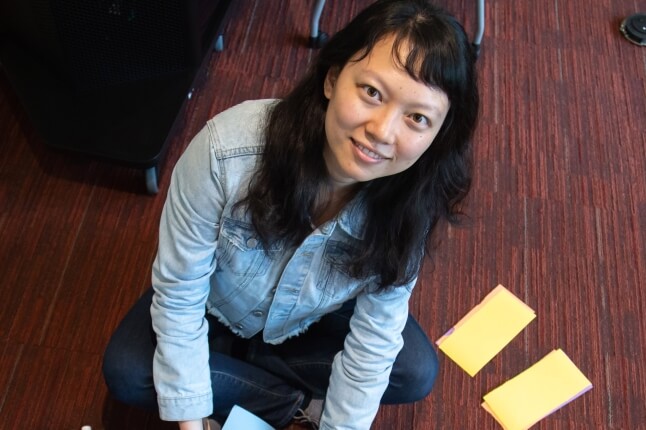News
First-year student Steven Wang launched UsTogether, a startup that provides an easy way for people to invest in the long-term financial health of the small businesses they care about. (Photo provided by Steven Wang)
Ninety-five percent of small businesses nationwide took a financial hit from COVID-19 in 2020, with 26 percent temporarily closing and 56 percent reducing operations, according to a survey by the Federal Reserve.
Many of those small businesses struggled to access financing from traditional lenders and have relied on community support to stay afloat. But individuals who want to support a business in their neighborhood often don’t know how to help beyond contributing to occasional, one-time fundraisers.
UsTogether, a startup founded by first-year Harvard student Steven Wang, is looking to solve both problems simultaneously by providing an easy way for people to invest in the long-term financial health of the small businesses they care about.
“I think COVID has been a catalyst for people realizing just how important small businesses are. That mom and pop shop, that is part of the fabric of what makes up a community,” said Wang, who intends to pursue a joint concentration in philosophy and computer science at the John A. Paulson School of Engineering and Applied Sciences. “I wanted to create a product that would help small business owners get the sustainability they need in a community-focused way.”
The startup seeks to create index funds of similar small businesses in one area of a community, then enable individuals to invest in those funds. For instance, a coffee-lover could purchase shares of the “Detroit Coffee Fund,” which would contain stock in several local, independent coffeeshops.
UsTogether negotiates stock deals with businesses, which provide high-quality financial support while eliminating the leg-work and pitfalls of fundraising. Investors reap benefits from those deals, such as cash dividends or perks like a free weekly cup of coffee from a favorite café.
The potential impact this novel solution could have on struggling businesses was recognized by Schmidt Futures, a philanthropic initiative launched by former Google CEO Eric Schmidt and his wife, Wendy, that brings talent together into networks, bets on the most promising ideas through competition, and equips people to scale through partners and thoughtful application of modern tools.
Wang was named a winner in Schmidt Futures' 2020 Reimagine Challenge, aimed at sourcing the best proposals from college and university students around the world to build a better future. The challenge is part of a broader, $1 billion commitment from Eric and Wendy Schmidt to identify and support global talent working to help address the world’s most pressing problems. Wang is now eligible to receive up to $25,000 in tuition scholarships, and Harvard can receive up to $25,000 in additional prize money.
“The challenge was great because it helped me really crystallize the businesses concept behind this idea by really outlining the business aspects and the structure of the company, from the business funnel to the go-to-market strategy,” he said. “I love building products, companies, and startups, so this was right up my alley.”
Wang is riding high off this vote of confidence from the Reimagine Challenge (he is one of 20 winners from among 838 global submissions), but he is far from a stranger to entrepreneurship.
“Growing up, I’ve always been super-fascinated by products, business, and creating things that people really want,” Wang said.
When he was a high school sophomore, Wang launched the startup Realism, which used virtual reality to provide unique educational experiences for students. (Photo provided by Steven Wang)
He launched his first business venture as a first-grader—selling origami paper cranes after school for $1 each. From there, he moved on to peddling Pokemon and Yu-Gi-Oh! cards. By the time he was in middle school, Wang was running an international drop shipping operation, selling Chinese electronics and fashion items in online storefronts like eBay and Amazon.
At the same time, he was getting more involved in competitive robotics and picking up technical skills as a hardware and software engineer. Looking to combine his engineering acumen with his passion for business, he launched a startup, Realism, as a high school sophomore.
The company used virtual reality to provide unique educational experiences for students. For instance, users could practice Spanish while strolling the virtual streets of Madrid, or utilize physics knowledge by building a rocket that blasted off to the moon.
“The best part about it was seeing the students in the classroom using something that I’d built with my blood, sweat, and tears,” he said. “That’s when I really found my love for creating products and building apps that would impact people’s lives.”
Wang recruited two co-founders and, after the startup was accepted into an accelerator at the MIT Media Lab, he dropped out of high school and moved to Boston to work on Realism full time. The startup raised a seed round from several venture capital firms and built a team in Boston after leaving the accelerator.
Realism grew quickly, attracting more than 300,000 students to the platform within a few months, and the startup was acquired by an education company in 2019.
Wang with Apple CEO Tim Cook. After his startup, Realism, was acquired, Wang joined Apple as a product manager, where he spent half a year working on the Apple Watch. (Photo provided by Steven Wang)
Not missing a beat, Wang moved to San Francisco and joined Apple as a product manager, where he spent half a year working on the Apple Watch. While he enjoyed the challenges and learning opportunities from his time in big tech, he decided to return to Michigan and finish high school. At the start of his final semester, the COVID-19 pandemic exploded.
While completing his coursework virtually, Wang moonlighted as a product manager. He started helping a friend who was building a startup that aimed to create a Slack-style platform for on-the-go workers. As Wang talked with potential customers, most of whom were small business owners, he learned about the struggles they faced just to get by. Many restaurant owners were having trouble getting information about pandemic-induced operational changes, like delivery and takeout options, to their customers.
So Wang shifted gears and launched a new platform called Takeout COVID, which featured an interactive map that centralized small business information. Users could easily see the open small businesses in their neighborhood and get information on new pandemic policies and procedures with one click.
“That was the first time I really saw how difficult it was to be a small business owner in the U.S., and COVID-19 was a huge catalyst of that. The biggest problem for a lot of these businesses during COVID has been money, which has been made worse by all the issues with the Paycheck Protection Program and other grant funding,” he said. “But even before that, historically 90 percent of all small businesses die out within the first 10 years. And the largest part of that is a lack of sustainable resources.”
That realization inspired UsTogether.
Wang is currently building a basic version of the app, which he hopes to finish before the end of the summer. While he works on the technical side, he must also navigate the complex regulatory requirements of the Securities and Exchange Commission before he can officially launch the startup and start raising seed funding.
He’s excited about the entrepreneurial resources Harvard offers, but is also looking forward to immersing himself in a liberal arts education, exploring other areas he is passionate about, and trying a few different clubs and student organizations.
With his college career just beginning, he hopes to use his experiences to inspire and mentor other Harvard founders.
“The biggest lesson I’ve learned is never stop grinding and never lose faith. My path in entrepreneurship has been one of constant failure punctuated by big wins. That is one thing I’ve learned, through every failure and through every down, you need to power yourself through it,” he said. “You need to see hope, see the light at the end of the tunnel, and have absolute confidence in what you’re building.”
Cutting-edge science delivered direct to your inbox.
Join the Harvard SEAS mailing list.
Press Contact
Adam Zewe | 617-496-5878 | azewe@seas.harvard.edu






